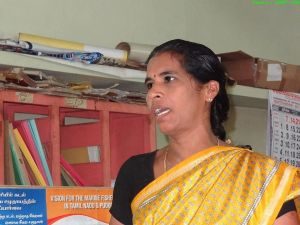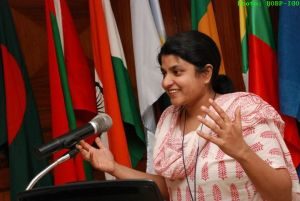
Ms Rani, wife of a fisher from Toothoor area in Kanniyakumari district of Tamil Nadu, India. Her husband, besides catching tuna, also catches sharks. Ms Rani was speaking in a stakeholder meeting convened by the BOBP-IGO to discuss the shark fisheries management plan. Photo: BOBP-IGO
Most marine and fisheries development projects are gender blind, even though, in recent years, they generally pay much more attention to reaching out to fishing communities. What does a major, multi-country project do when it wants to get serious on overcoming its gender-blindness? For sure, the project partners face a steep learning curve, but the FAO-managed Bay of Bengal Large Marine Ecosystem (BOBLME) project has taken the plunge. In 2012, it commissioned a major study by Cecile Brugere to help them work out where they stood and what to do. BOBLME has now published Dr Brugere’s report – Mainstreaming Gender in the BOBLME Project: gender audit and recommended actions for mainstreaming a gender perspective – and it is a very useful guide with wider relevance than just BOBLME. It is a veritable “how to” and literature review from which new and even experienced practitioners can learn a lot. Also significant is that this is the first of the Global Environment Facility (GEF) supported Large Marine Ecosystem projects to undertake a thorough gender audit.
The Regional Coordinator of the Bay of Bengal Large Marine Ecosystem Project (BOBLME), Dr Chris O’Brien told Genderaquafish that, ” even though BOBLME countries faced many challenges in tackling gender inequalities, now there is some clarity and guidance on what needs to be done. Moreover, the countries are supportive of addressing gender considerations in a concerted way in the next five year phase of the Project.”
Download the report: ![]() Mainstreaming gender in the BOBLME Project: Gender audit and recommended actions for mainstreaming a gender perspective in the BOBLME project and its Strategic Action Programme (SAP), By Cecile Brugere
Mainstreaming gender in the BOBLME Project: Gender audit and recommended actions for mainstreaming a gender perspective in the BOBLME project and its Strategic Action Programme (SAP), By Cecile Brugere
http://www.boblme.org/documentRepository/BOBLME-2012-Socioec-02.pdf

Ms Tanvi Vaidyanathan, Consultant working with the BOBP-IGO in the Gulf of Mannar Project. In the picture, Ms Tanvi is delivering a lecture in the Regional CCRF Training programme. Photo: BOBP-IGO.
EXECUTIVE SUMMARY
This paper was prepared to support the mainstreaming of a gender perspective in the BOBLME Project and SAP. The gender audit of international and regional instruments the eight BOBLME partner countries are signatories, as well as national development and fisheries policies highlighted uneven progress in tackling gender inequalities and accounting of gender issues, overall denoting a cultural and institutional environment that may not be at all times conducive of gender mainstreaming initiatives. While the majority of the BOBLME Project documents audited were found to be gender-blind based on their sole contents, this was attributed to a lack of awareness rather than an intended oversight. Despite the relative advancement of the project, entry points to mainstream gender in the SAP were identified through:
- The addition of a statement of political will or commitment to gender,
- The consideration of gender-sensitive actions,
- The addition of a section on cross-cutting issues covering gender training, communication, legislation, capacity building at field level, gender-disaggregated data collection and research on gender issues,
- The consideration of incentives and accounting mechanisms,
- The earmarking of a specific budget for gender-related activities at project level and strategic actions.
- The addition of a pathway to impact.
- The use of outcome mapping as a form of monitoring and evaluation.
- The last two are seen as pivotal in capturing the changes that are expected as result of both mainstreaming gender in the project, and the project’s own influence in progressing towards gender equality.
In addition to these, key recommendations for future action by the BOBLME partner countries include:
- Commissioning of a gender-sensitive review of legislation and regulatory frameworks in the BOBLME partner countries,
- Following through the mainstreaming of gender in the NAPs, mirroring what has been proposed to mainstream gender in the SAP,
- Tackling gender-disaggregated data collection as soon as possible,
- Ensuring the continuous provision of gender inputs throughout the project duration,
- Strengthening the participatory processes undertaken so far by the project,
- Avoiding falling in the Women in Development/efficiency rhetoric and maintaining a focus on the addressing of gender issues and inequality,
- Supporting gender training and capacity building at all levels, beyond the life of the project.
This entry was posted in: Gender, Men, Women
